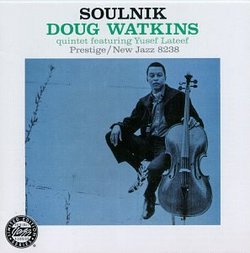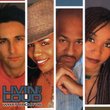| All Artists: Doug Watkins Title: Soulnik Members Wishing: 1 Total Copies: 0 Label: Ojc Release Date: 1/25/1995 Genres: Jazz, Pop Style: Bebop Number of Discs: 1 SwapaCD Credits: 1 UPCs: 025218184823, 0025218184823 |
Search - Doug Watkins :: Soulnik
 | Doug Watkins Soulnik Genres: Jazz, Pop
|
Larger Image |
CD DetailsSimilar CDs
|
CD ReviewsOverlooked Bassist Delivers Gem Benjamin I. Smith | Pittsburgh, PA | 12/09/2005 (5 out of 5 stars) "Doug Watkins was an extremely solid and inventive bassist featured on many excellent jazz records of the late 1950s. He died at a young age in the early 1960s, making this album that much more important. Watkins apparently started playing the cello just a few days before featuring the instrument on this album, but you can't tell by listening. The sound is warm, exotic at times, and the presence of Yusef Lateef has a strong impact on the overall feel of the album. These OJC "Limited Edition" titles are not really limited, it seems, just more expensive. However, many choice titles can be found under the limited edition heading, and this one (which probably deserves something like 4.5 stars instead of 5) is amongst those worth pursuing." Rules Hard! Leggo Ami | Richmond, VA USA | 04/05/2007 (5 out of 5 stars) "This cd is a must have if you are a fan of the unusual combination of bass and cello in a swingin' jazz setting. It belongs on your shelf alongside Sam Jones' "The Soul Society" and Nat Adderley's "Work Song," two other Riverside/OJC releases that feature bass and cello. Curiously, all three were recorded in 1960. Watkins, like Jones, was a fantastic musician. Soulnik has the added bonus of Yusef Lateef, who cooks on flute and oboe, of all things. Most tracks are relatively uptempo with only a few ballads." Chambers' contemporary and soul brother Samuel Chell | Kenosha,, WI United States | 05/14/2010 (5 out of 5 stars) "I was fortunate to hear Doug live in Paris (with Donald Byrd's group), and it was a pleasure merely to watch him form an integral, indivisible relationship with his instrument, and then to discern the quietly insistent support of his walking bass lines (there was rarely a thought given to amplification of the bass in those days, and the music, imo, was the better for it). Some of his best work is with Art Blakey and Horace Silver ("The Jazz Messengers" on Columbia is a desert island disc if there ever was one--with Silver's "Ecarole" making five instruments sound like a small big band). Watkins' bass is also highly visible on some albums made with Donald Byrd on the tiny Transition label, including one--"Watkins at Large"--under his own name. Whereas I've laid numerous bass-heavy albums to rest after several listenings, Watkins' work invites multiple playing because it's not about making an "impression": it's all about creating a deeply satisfying, soul-stirring, foot-tapping experience. When I think of Watkins, the picture that comes to mind is that of a musician who essentially "was" his instrument.
"Soulnik" is somewhat of a curiosity because it features Doug in the limelight--and on cello rather than bass. Just as his relative and fellow Detroiter Paul Chambers became renowned for his jazz arco solos, Watkins was beginning to attract some notice because of his jazz facility on the uncustomary instrument. Based on the evidence of this session, he was close, if not equal, to the great Oscar Pettiford, who had introduced the instrument to jazz. Had he lived, there's little doubt that he would have taken it in directions all his own (Harry Babasin, on the West Coast, was also showing how to cook on a cello). With an unselfish musician like Yusef Lateef on hand, the chemistry can't help but be right. It may be a cello, but other than that difference, this is prime-time mainstream jazz that appeals equally to the head and heart and should be accessible to listeners of all ages and tastes. "Soulnik" may be from the same period, but this is one session that didn't go the way of the Beatniks. It sounds as fresh today as it did 50 years ago." |

 Track Listings (6) - Disc #1
Track Listings (6) - Disc #1

